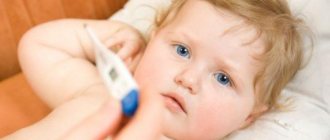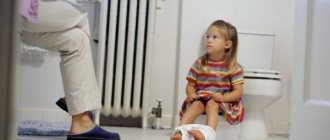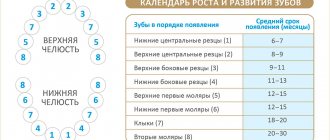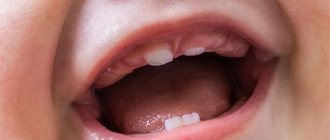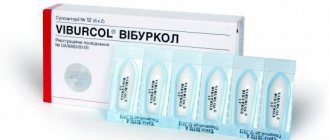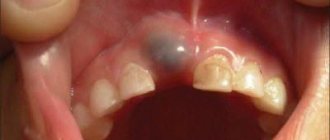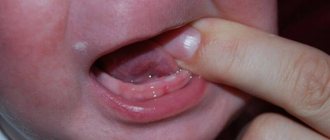The formation of baby teeth is a stressful situation for a baby, to which his body usually reacts with an increase in body temperature. Of course, this happens not only because of teething. It will be useful for many parents to know what to do when their baby suddenly has a fever.
What causes body temperature to rise during the formation of baby teeth?
There is a misconception that a child’s elevated body temperature during the eruption of baby teeth is not normal and therefore measures should be taken to lower it to a normal level. In fact, this is not so. The fact is that at the site of tooth eruption, the body’s immune defense decreases. Harmful bacteria enter the disturbed gum and cause an inflammatory process, which is always accompanied by an increase in body temperature. It should be understood that elevated temperatures have a detrimental effect on harmful microorganisms. Of course, this does not mean that excessively high temperatures during teething are normal.
Parents of the baby should not worry if, during the formation of baby teeth, the baby’s body temperature does not exceed 38 degrees.
In one-year-old babies, the process of tooth formation is much more complicated. It is after the first year of life that a child’s canines and molars begin to form. These teeth erupt much more slowly and, accordingly, increased body temperature can persist for a long time. Their long formation is explained by the uneven shape of the molars and their size. Sometimes it lasts several weeks.
The same situation occurs during the eruption of eye teeth. Their roots are located much deeper than the rest of the baby's teeth. Therefore, the growing eye tooth has to travel a longer path to the gum surface. All this time, the child experiences discomfort, and his body responds to it with an increase in body temperature.
In essence, the emerging baby teeth tear the soft tissue of the gums, and this cannot be painless. In this place, the immune defense is weakened due to injury. During the formation of molars, children often develop a fever. This happens when the impact of harmful microorganisms becomes too powerful, that is, an infectious infection has occurred. In this case, the body temperature rises to 38 degrees, and sometimes above.
What reaction is possible for a baby when teething?
What reaction can a child have when baby teeth appear? During this period, children may react in different ways:
- Some children tolerate this period quite normally. The only symptom that worries them is itching in the gums, increased salivation and a slight increase in body temperature.
- Other babies react very hard to teething: the temperature may rise to 38-39 degrees, they do not sleep at night, and refuse to eat.
- There are also little ones who are luckier than others: their teeth appear without any problems and almost imperceptibly.
What is the maximum permissible body temperature of a child during the formation of teeth?
How high a baby's body temperature can rise depends on the condition of his body. During teething, a normal body temperature is considered to be between 37.5 and 37.7 degrees. The maximum permissible temperature is 38 degrees. If it increases further, then measures should be taken to reduce it.
Parents should remember that during the period of formation of baby teeth, the child’s body temperature should be measured more often.
If the child’s body temperature reaches 39 - 40 degrees, this means that urgent medical attention is needed, since, most likely, the infection has penetrated the baby’s respiratory system.
How long can an elevated body temperature remain?
There is no clear answer to this question. It all depends on the health of the baby. As for the results of long-term observations, on average, the increased body temperature of a child during the formation of baby teeth persists for one to three days. It is important to note that when the top of the tooth appears above the surface of the gum, body temperature returns to normal. This happens as each tooth erupts.
However, statistics show that in some children, elevated body temperature persists for four or even five days, and the fever can last only a few hours and go away on its own.
Knowing all of the above does not mean that parents should not show their baby to pediatricians. An extra examination by a specialist will never hurt, but, on the contrary, will help identify diseases at the earliest stage of their development.
Why does the temperature rise
Such a characteristic sign during the formation of masticatory organs as temperature occurs in 50-70% of children. It can appear every time teeth are cut, or maybe only in isolated cases. Most fathers and mothers face a “bouquet” of problems during the “birth” of teeth, including the appearance of hyperthermic syndrome. In fact, it is a shield for the active release of specific substances. To extinguish pathology, the body needs energy and resources. Provoking factors:
- The baby does not have fully formed life support systems, so they malfunction as soon as a provocateur appears.
- Heat exchange in the body is disrupted, which affects temperature indicators.
- Decreased appetite and sleep disturbance weaken the toddler’s body even after a year.
All this weakens the overall immune system. In such conditions, pathogenic microorganisms ideally multiply. To prevent this, body temperature rises. Therefore, the fact that the temperature has increased is quite natural. If there are no complications, there is no need to be afraid. But sometimes, when teeth appear, secondary diseases develop. This happens when the protective functions do not work and bacteria actively continue to multiply. Depending on where the infection is localized, the following ailments appear:
- Stomatitis or gingivitis
- Tonsillitis, adenoiditis or pharyngitis
- Laryngotracheitis or bronchitis
- Enteritis or dysbacteriosis
In order to clarify the reasons, you need to consult a pediatrician. If he recommends lowering the temperature during teething, then he will prescribe certain medications. The mother must constantly monitor the baby. It must be remembered that children react differently to deterioration in well-being. Therefore, parents should monitor their child’s behavior.
What symptoms can accompany high temperature?
During the period of teething, in addition to elevated temperature, the child may exhibit other symptoms. Often at this time, swelling of the gums occurs, which can reach the mucous membrane of the nose. This phenomenon is accompanied by a runny nose and copious discharge of clear fluid from the nose. Swelling most often occurs when the baby's upper teeth erupt.
If the elevated body temperature persists for five days, then you should immediately call a doctor.
You should also know that during teething, babies produce copious amounts of saliva. It is especially pronounced when the lower teeth erupt.
How to reduce a child’s temperature with medications - tablets, syrups
Today one of the most popular drugs is Nurofen.
It is available in the form of syrup, capsules and rectal suppositories. For each age, you can choose your own option to safely and painlessly give medicine to your baby. Paracetamol, which can be found in the pharmacy in the form of tablets or syrup, has a good effect.
Some parents use ibuprofen, which is recommended for acute inflammatory diseases, teething and other pathological conditions, starting from 6 months.
Warning symptoms
During the period of teething, the child’s body is weakened and therefore more susceptible to viral or bacterial diseases. At this time, you need to monitor your baby with maximum attention. You should seek help from a doctor if you have the following symptoms:
- The baby's nose is very stuffy and a purulent substance is released from it. Such signs indicate the likelihood of rhinitis, which can only be cured with medication.
- The appearance of diarrhea does not mean that it is directly related to teething. Most likely, an infection entered the child's stomach through toys or a gum teether. The baby should be shown to a doctor.
- During teething, the baby's mouth produces copious amounts of saliva. The child does not always have time to swallow it, and this causes him to cough, or rather, cough. If the cough becomes prolonged, this means that the baby’s respiratory system has become infected. You can’t do this without the help of a doctor.
- It should also be taken into account that teething cannot cause redness in the throat. If this happens, it means that the child has pharyngitis or a general respiratory disease.
- Vomiting at elevated body temperature during teething is an alarming signal. This happens when the nervous system is damaged or due to an intestinal infection. Calling a doctor in such a situation is mandatory.
All of the above symptoms are alarming, even if they appear without elevated body temperature.
Is immunity really developed?
There is no consensus on this matter.
It is believed that high temperature is the body’s response to the penetration of viruses, microbes, and bacteria into it. And the pyretic mechanism, which turns on at this moment, helps to literally “fry” all these harmful strangers. When are antipyretic medications needed? Many pediatricians advise parents to do the following - if the baby has a fever, and he tolerates it quite well, continues to do his work, plays and does not experience weakness - then antipyretics should not be given up to the maximum limit of 38.5 degrees.
If the baby is literally lying flat, and in previous cases of hyperthermia he had convulsions or vomiting, then the medicine must be given, and not wait for the number 38.5 on the thermometer.
Child's body temperature when replacing baby teeth with permanent ones
During the period of loss of baby teeth and the appearance of permanent teeth, the child’s body temperature remains normal. Only some children's body temperature rises when permanent molars begin to form. The reason for this is the size and shape of the molars.
Typically, children's first permanent teeth begin to form at the age of six. If at this time the child’s temperature rises, then there is a possibility of gingivitis. This disease is characterized by inflammation of the mucous membrane of the gums and requires treatment.
How should parents behave when their child’s body temperature rises?
Many parents, having discovered an increase in the child’s body temperature during the period of teeth formation, try to bring it down with antiviral or antipyretic drugs. Meanwhile, there is no need to rush in such a situation.
A body temperature within 37 degrees should not cause anxiety in parents, since this is the norm during teething, and more precisely, a normal protective reaction of the body. In such a situation, you just need to wait until the body itself copes with the pathogenic microorganisms that have penetrated it.
However, if the body temperature exceeds 38 degrees and the baby experiences attacks of fever, it is advisable to use antipyretic drugs. If this does not help, then the baby should be wrapped in a diaper soaked in a weak vinegar-alcohol solution or simply moistened with cool water.
If high temperature and fever attacks occur for three days, then a medical examination of the baby is necessary. He probably developed some kind of disease that had nothing to do with teething. It is allowed to use homeopathy instead of antipyretic drugs. These drugs cannot reduce body temperature, but at the same time significantly improve the general condition of the baby. This in turn contributes to a speedy recovery. However, the use of homeopathic medicines without the approval of a pediatrician is unacceptable.
What to do if a child has a fever on his teeth?
The presence of a temperature reaction to teething in a small child is a normal protective reaction of the child’s body. This is a natural immune response that helps fight gum inflammation. But if the thermometer creeps to 38 or higher, and there is a deterioration in the child’s general condition, antipyretics should be used after prior consultation with a doctor. Manifestations that require an antipyretic:
- The child’s well-being is noticeably deteriorating: lethargy, sleeps a lot during the day, but is restless at night, is not interested in toys, cries and is capricious;
- Lips become dry, cheeks turn red and eyes shine;
- Rare urination.
- Rapid breathing and irregular heartbeat;
- Convulsions develop.
To avoid maximum body temperatures of the child and the unpleasant consequences of this, you need to do the following:
- The room where the child is located should not be hot, 18°-19° is enough;
- The child's face should be wiped with a damp cloth and the body should also be wiped every two hours.
- Give plenty of fluids (water).
When, despite all the measures taken, the temperature remains at maximum values or fluctuates for two or more days, if the child’s skin turns pale and other unhealthy symptoms develop (vomiting, cramps, diarrhea, etc.), you need to call an ambulance. In all other respects, a low temperature does not in any way restrict the child from walking, eating or playing if his health is good. The only thing is to somewhat limit contact with other children so as not to catch some kind of infection and try not to introduce new foods into the baby’s diet until the baby’s teeth cut through.
Will walking during teething be harmful?
If during the period of teething the child’s body temperature does not exceed 37 degrees, and the baby himself does not suffer much from this, then walks will benefit him. In such a situation, the baby should be dressed for the weather and walked with him away from people to avoid possible infection. You should not get involved in active games at this time.
If the baby’s body temperature has risen above 37 degrees, and he himself does not feel well, then it is better to refrain from walking until he recovers.
In conclusion, let us remind you that self-treatment of children is always fraught with bad consequences. Do not hesitate to contact your doctor again.
How to measure temperature correctly
Before giving your daughter or son any medicine, you should make sure that the temperature has actually risen.
Thermometers help measure it, so they should be in your home medicine cabinet. The following methods can be used:
- 1. Use a regular glass mercury thermometer. And although this method is considered not fashionable today, it shows the most accurate numbers.
- 2. An ear thermometer is a good device for very young children, since you can get the result in just a few seconds, and no contact with the skin is required.
- 3. Digital ones are not as accurate as classic ones, but they are especially popular with parents of all ages.
- 4. Frontal ones are most often found in large clinics. This is very rare in home practice.
- 5. Thermometer - the pacifier will be an ideal assistant for mothers and fathers if the child is not yet a year old.
Each of the presented options works differently. Therefore, before you start using it, you should read the instructions.

